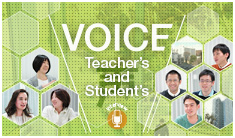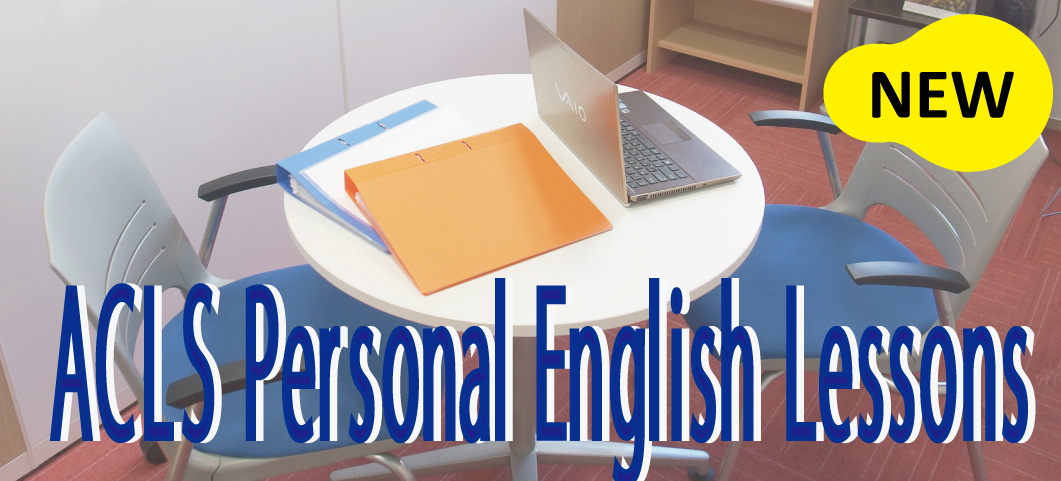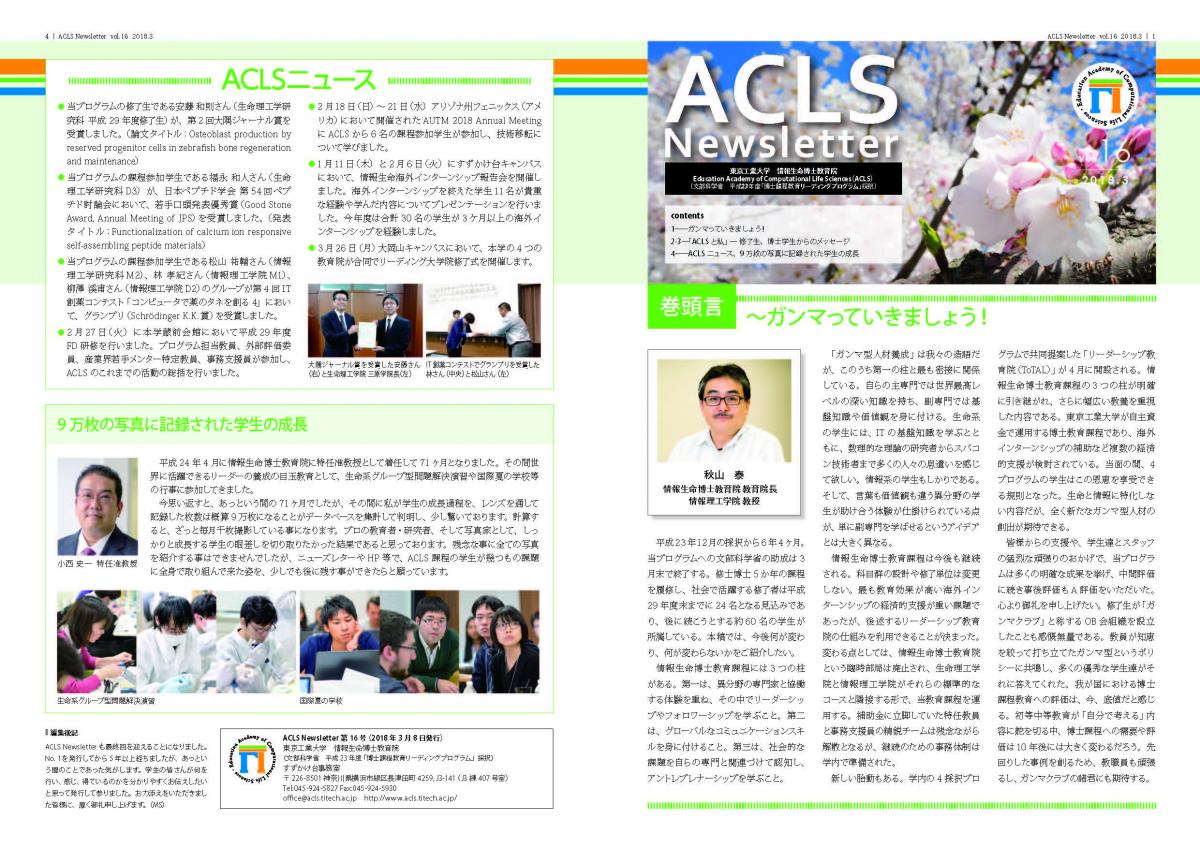- Home
- Teacher's and Student's voice
- Yu Ito / Miki Okuno
Yu Ito / Miki Okuno


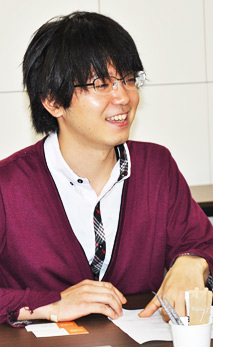 Ito: I came from a technical college. In my technical college, we had a whole lot of people who were studying various fields, such as IT, machinery, electronics, and so on, all living together in the one place, in the same dormitory. We talked about a whole range of different fields, and so we had a great opportunity to learn about the way other people in different fields thought. I was always thinking, "This is interesting", and so I ended up with an interest in the whole of science. However, just when I was starting to feel that my opportunities to meet people from different fields seemed to be getting fewer since I came to university, I heard about ACLS. ACLS was not only an opportunity to increase my interactions with people from other fields, it also offered the chance to study fields that interested me, like computers. My specialty is bio-organic chemistry (nucleic acid chemistry). The development of techniques in organic chemistry have been outstanding and you can confidently try to form compounds with almost any molecule that you want. So the important thing is which molecules to use to form which compounds? That's the thing. What made me decide to participate in ACLS was that I thought I would get the chance to be involved with people from other areas of life science, and improve my opportunities for research as a result.
Ito: I came from a technical college. In my technical college, we had a whole lot of people who were studying various fields, such as IT, machinery, electronics, and so on, all living together in the one place, in the same dormitory. We talked about a whole range of different fields, and so we had a great opportunity to learn about the way other people in different fields thought. I was always thinking, "This is interesting", and so I ended up with an interest in the whole of science. However, just when I was starting to feel that my opportunities to meet people from different fields seemed to be getting fewer since I came to university, I heard about ACLS. ACLS was not only an opportunity to increase my interactions with people from other fields, it also offered the chance to study fields that interested me, like computers. My specialty is bio-organic chemistry (nucleic acid chemistry). The development of techniques in organic chemistry have been outstanding and you can confidently try to form compounds with almost any molecule that you want. So the important thing is which molecules to use to form which compounds? That's the thing. What made me decide to participate in ACLS was that I thought I would get the chance to be involved with people from other areas of life science, and improve my opportunities for research as a result.
Okuno: The time when I heard about ACLS was just when I was having trouble deciding whether to go on to further study or to start looking for a job. The research was interesting in itself, but I still felt uncertain. I thought "If I continue on like this for another three years of Doctoral Study, I will have the feeling my horizons outside my specialist field of study are going to get pretty narrow." In the final analysis, I think research comes down to being somebody that does something of use to other people and contributes to society. For that reason, I thought it was necessary to broaden my horizons while continuing with my research.
When I heard more details about the ACLS Program, I realized that it was a place where I would be able to not only study my specialist field, but also learn about a whole lot of other things as well. They also offer language lessons, and a lot of internships. So because of that, I thought, this is a place where I can become the kind of person who is able to give their research results back to society, and so I decided to apply.

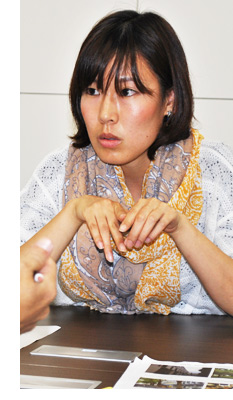 Okuno: The depth and the quality of the language curriculum was exactly what I expected. I think that as a result of that I was able to acquire the skills necessary for intercultural communication, which in my research up until now was something I had looked at as something I was obliged to tackle whether I liked it or not. At ACLS I have had the opportunity to do specialized courses in getting my point across to researchers working in the same field, and in academic writing. I feel that I have acquired a lot more practical skills than I expected.
Okuno: The depth and the quality of the language curriculum was exactly what I expected. I think that as a result of that I was able to acquire the skills necessary for intercultural communication, which in my research up until now was something I had looked at as something I was obliged to tackle whether I liked it or not. At ACLS I have had the opportunity to do specialized courses in getting my point across to researchers working in the same field, and in academic writing. I feel that I have acquired a lot more practical skills than I expected.
Ito: I feel the same. At ACLS we learn the basic mindset for using English in communication, and how to structure essays. This is useful not only for talking to people overseas, but also when you have to explain something or provide information to people in Japanese.
Okuno: Studying another field becomes a stimulus for research in your specialist field, I think. The discrete systems and automatons that we study in lessons are not only useful for changing how we look at things, and think about things, but the statistical knowledge helps us directly in our own research.
Ito: Having an environment set up for research is also something to be exceptionally grateful for. In the research in my specialist field, we use the tools of MD (Molecular Dynamics) and MO (Molecular Orbital Theory), which were actually the subject of a Nobel Prize in Chemistry. These incredible tools can instantly be used with "TSUBAME 2.5" (Note 1). Once again I am impressed by what a wonderful environment this is to work in.
And on top of that there are also information field lessons called "molecular simulation" using mainly MD and MO, so it is more than I ever could have desired (Laughs). And in addition to that, I have the opportunity to study the latest computer languages (Python), so it has really become a great opportunity to study all those "fields that I always wanted to try learning, but could never get around to because I had to give priority to my specialist field".
(Note 1)TSUBAME
A supercomputer set up and operated by the Global Scientific Information and Computing Center, Tokyo Institute of Technology since November 2010. Developed with the aim of producing "a supercomputer that everybody can use," it is a central hub not only in the campus, but also the nationwide super computer infrastructure "HCPI", and is used by both private companies and students alike.

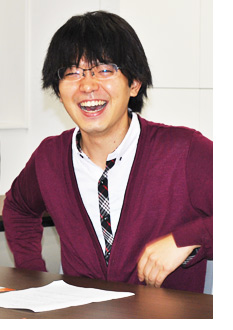 Ito: Well I already had an interest in information technology, so I didn't feel it was that much of a burden. In fact, probably more than that, I felt that the benefits outweighed the burdens. For example, I once asked an IT-side person "What is an algorithm?". When I casually ask that question, they broke it down into an easy to understand explanation for me. It was things like that that made me aware of the benefits of studying with people from multiple fields.
Ito: Well I already had an interest in information technology, so I didn't feel it was that much of a burden. In fact, probably more than that, I felt that the benefits outweighed the burdens. For example, I once asked an IT-side person "What is an algorithm?". When I casually ask that question, they broke it down into an easy to understand explanation for me. It was things like that that made me aware of the benefits of studying with people from multiple fields.
I have attended all kinds of lectures and taken part in events, which definitely uses time. However, I believe that "There is nothing that is not worth trying". So I think that rather than just vaguely spending time with no particular purpose, we have been given incredibly dense and rich time.
Okuno: In my case, I get a kind of feeling that the burdens and the benefits I gain are balanced at about 50-50. For certain we spend a fair amount of time attending various different kinds of lectures, and taking part in events, so the time we have to spend on research in our own specialist field is reduced. However, the chance to study the way of thinking and the systems of other fields, which I never had a chance to do as an undergraduate, is a large benefit for me I think.
The thing I particularly feel that way about is the "Problem-solving Group Exercise." It is interesting in a different way to classroom lectures, because you are actually using your hands, while tackling a common theme with people from different fields. It is a different way of using your brain to the research what we usually do, so we take it on with the feeling of playing a fresh sport.
When you are focusing on your own future, the things I have been involved in at ACLS (while I do feel it is a burden: laughs), I feel will probably be very useful to me in future.

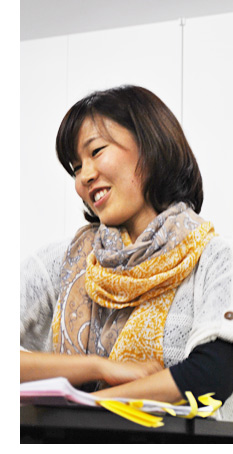 Okuno: This year is the second time I took part in "Summer School" (Note 2). Last year I just got involved without knowing anything much about what was going on. This year I was the organizer responsible for the poster session, and was involved in the planning right from the start. And in the middle of that, I suddenly realized "Wow! So this is what running organizations and events is like!".
Okuno: This year is the second time I took part in "Summer School" (Note 2). Last year I just got involved without knowing anything much about what was going on. This year I was the organizer responsible for the poster session, and was involved in the planning right from the start. And in the middle of that, I suddenly realized "Wow! So this is what running organizations and events is like!".
From the organizational side, I felt the importance, when doing anything, of having clear goals and targets. The poster session that I was in charge of was initially decided with the goal of fulfilling the support role of linking to group work. So we directed all of our planning and organization efforts towards meeting that goal. Even with the overall organization of the event, the organizing committee also has to unite the goals of the various different events together into one common goal, so you have to get involved in that, while thinking about what is necessary to achieve that goal, and what you need to do to make it happen. It was while I was doing this, that I felt that I have been able to make progress in a single direction and how to turn ideas and plans into a reality.
Ito: This is also my second time to take part. What I felt first hand this year was "Ah! This is a place where I can experience for myself first hand what we have studied in lectures". In the ACLS program there is something called the "Problem-solving Group Exercise". You learn how to bring together the power of a group in direct towards a set topic. The activities of the organizing committee are even more like this.
You have to think how to divide up responsibilities so that the efforts of the whole group go well. In order for us to fulfill our role as organizers, we have to consider how to heighten everybody's motivation (or to maintain it). And it was with these kinds of issues in mind that we got down to the business of making preparations.
During the period when we were actually holding the event, as one of the organizing committee member who was responsible for the group work activities, I was able to see the details of a whole lot of different groups' activities. The differences in their approaches made a big difference to the time it took to produce results, and to how well they succeeded or failed. The ability to see that difference was also one of the benefits that I gained. I would like the students who took part to think about "Why did my team do so well / or, alternatively, not do so well". That way of thinking is important for goal setting and for the activities necessary to reach those goals, and I think it is important to give back to others the knowledge that I gained from my experience this time.
(Note 2) Summer School
The Summer School (ACLS International Summer School) is held with the purpose of providing a forum for a wide variety of debates and interchange between researchers and students from various fields. In 2013 the school was held between 9 - 13 September at Imperial College London. Ito, as part of group work, and Okuno, as part of the poster session, both participated as organizing committee members in this activity.

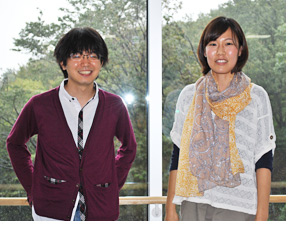 Ito: By not only shutting yourself up in your own specialization but instead collaborating with a wide range of people, you can make the best use of your strong points. And I think doing that is also necessary as part of how you intend to live your life. The main pillars you have to support you in this are your knowledge in your specialist field, your language ability, and then your communication ability. I feel that by participating in the ACLS program, I have been able to strengthen those central pillars more than I had thought.
Ito: By not only shutting yourself up in your own specialization but instead collaborating with a wide range of people, you can make the best use of your strong points. And I think doing that is also necessary as part of how you intend to live your life. The main pillars you have to support you in this are your knowledge in your specialist field, your language ability, and then your communication ability. I feel that by participating in the ACLS program, I have been able to strengthen those central pillars more than I had thought.
In particular, I learned a lot of things about communication at ACLS. I participated in group-work, and I was a member of the organizing committee for "Summer School". In these situations, although I had never been able to state much of an opinion before, since coming to ACLS I have become positive in being able to say things. I had many unexpected opportunities to engage in interchange, not only with students from other fields within the school, but from other universities as well, and also had the feeling of expanding my own network of connections.
Okuno: In the future, when I go out into the real world, the people around me are probably not going to know anything about my specialist field, and it may even be that we speak different languages, I think. In the middle of all that, I feel that ACLS provides the training for positively transmitting the information I possess.
Since I came to ACLS, I realized not only the importance of specialization and knowledge, but also of the ability to transmit it to all kinds of people, and I understand that new discoveries can come by looking at the same thing from a different perspective. Here I feel that I am learning how to make best use of myself when I go out into the world later, and how to get the best out of other people.
I think it is difficult to be engaged in multiple genres, but I am convinced the rewards are very large. I believe that very strongly.
(Note) The contents of the interview are accurate as of the time of interview in October 2013.






